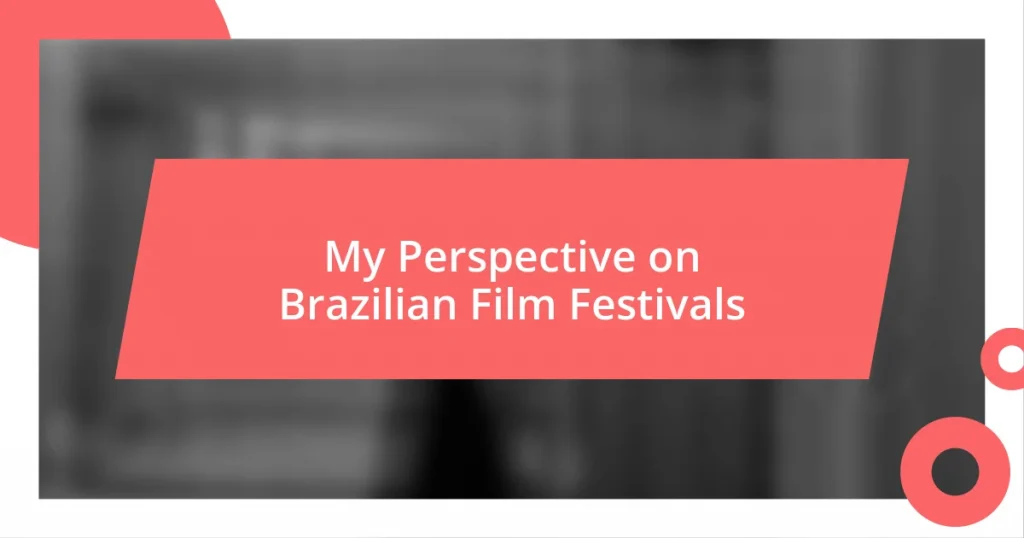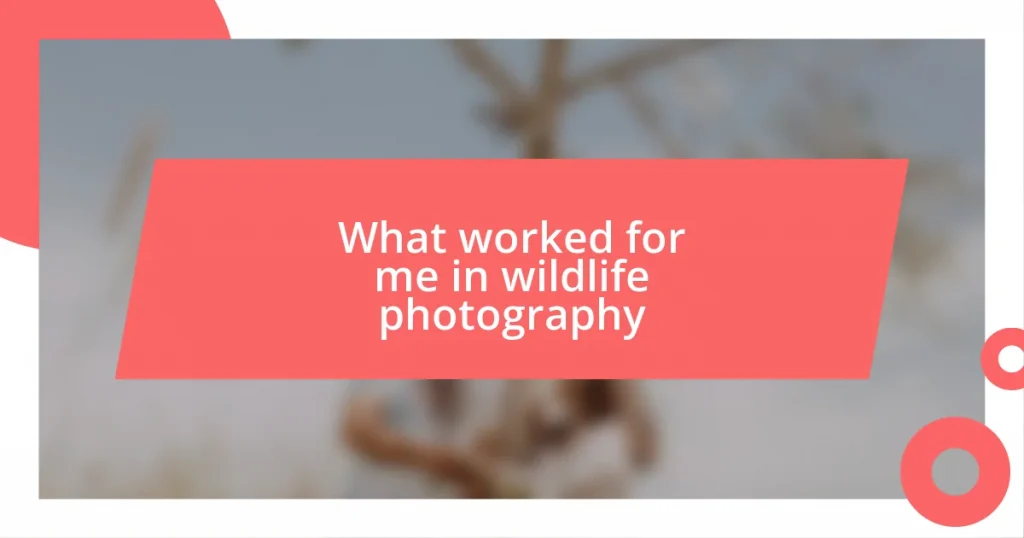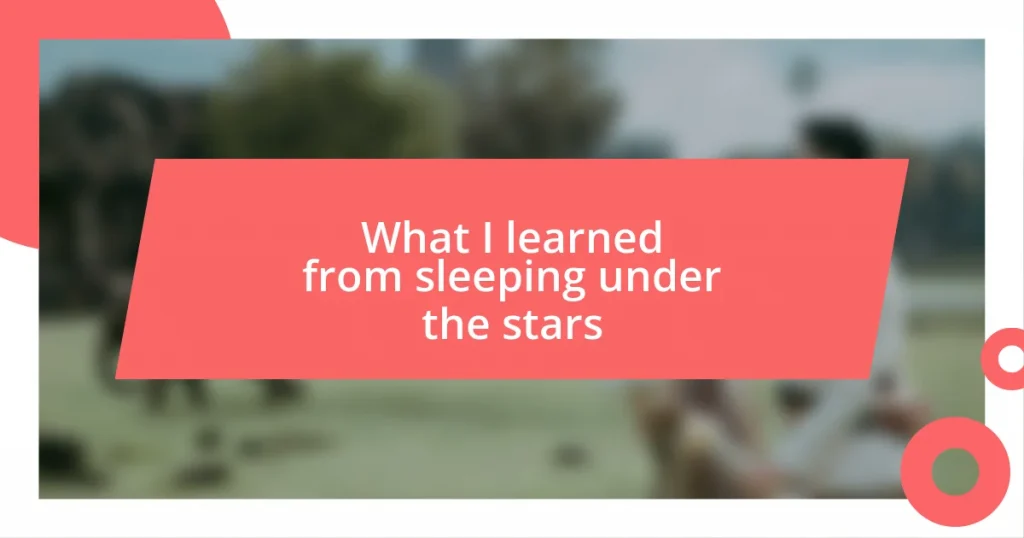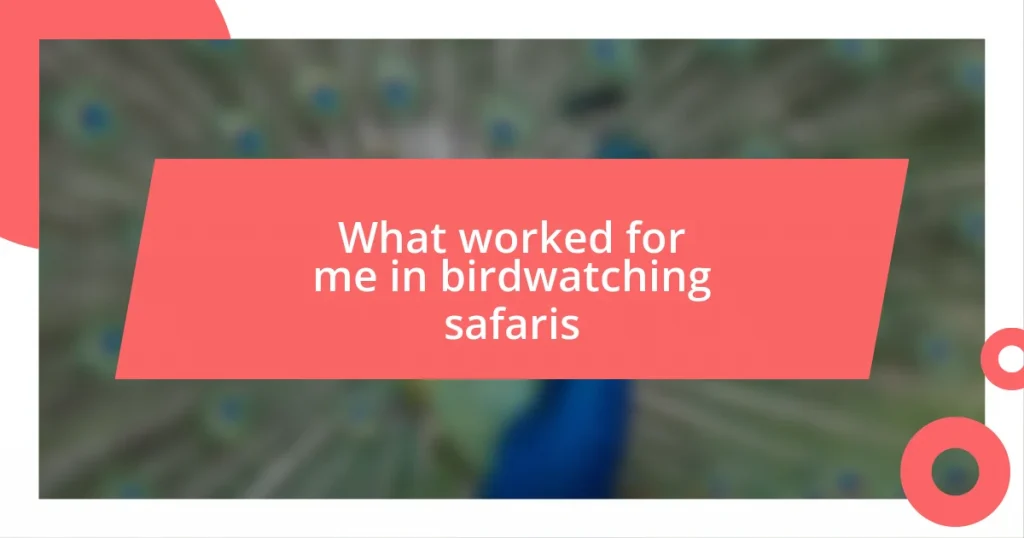Key takeaways:
- Brazilian film festivals celebrate culture and creativity while providing platforms for emerging filmmakers and demonstrating the diversity of narratives in cinema.
- Major festivals like Festival do Rio, São Paulo International Film Festival, and Brasília International Film Festival offer various participation opportunities, including screenings, workshops, and discussion forums that promote community engagement.
- Notable films such as “Central Station,” “The Second Mother,” and “City of God” highlight societal issues in Brazil, sparking important conversations about human connection and social realities.
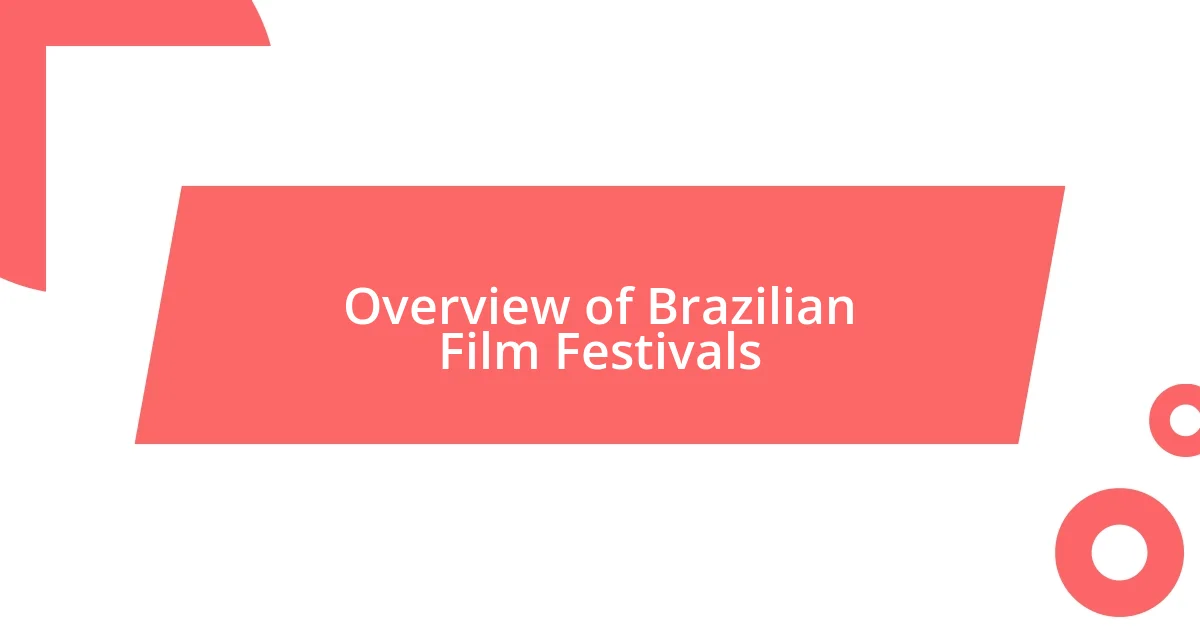
Overview of Brazilian Film Festivals
Brazilian film festivals have blossomed into vibrant celebrations of culture, creativity, and community. I remember attending the Festival do Rio for the first time, captivated by the atmosphere. Each film felt like a window into Brazil’s diverse narratives, showcasing everything from social issues to enchanting stories of everyday life. Doesn’t that just spark a curiosity about the tales waiting to be told?
These festivals often serve as launching pads for emerging talent. I recall chatting with an up-and-coming director whose film was receiving its world premiere. His excitement was infectious, and it struck me how these platforms not only highlight established filmmakers but also nurture fresh voices in cinema. Can you imagine being part of an audience that witnesses the birth of the next cinematic gem?
As these festivals continue to evolve, they embrace a growing international presence, attracting filmmakers and audiences from around the globe. The blending of local and international films creates a unique tapestry of stories, enriching the viewing experience. I often wonder how this exchange shapes the future of Brazilian cinema, and if this cultural dialogue will lead to even more groundbreaking narratives.
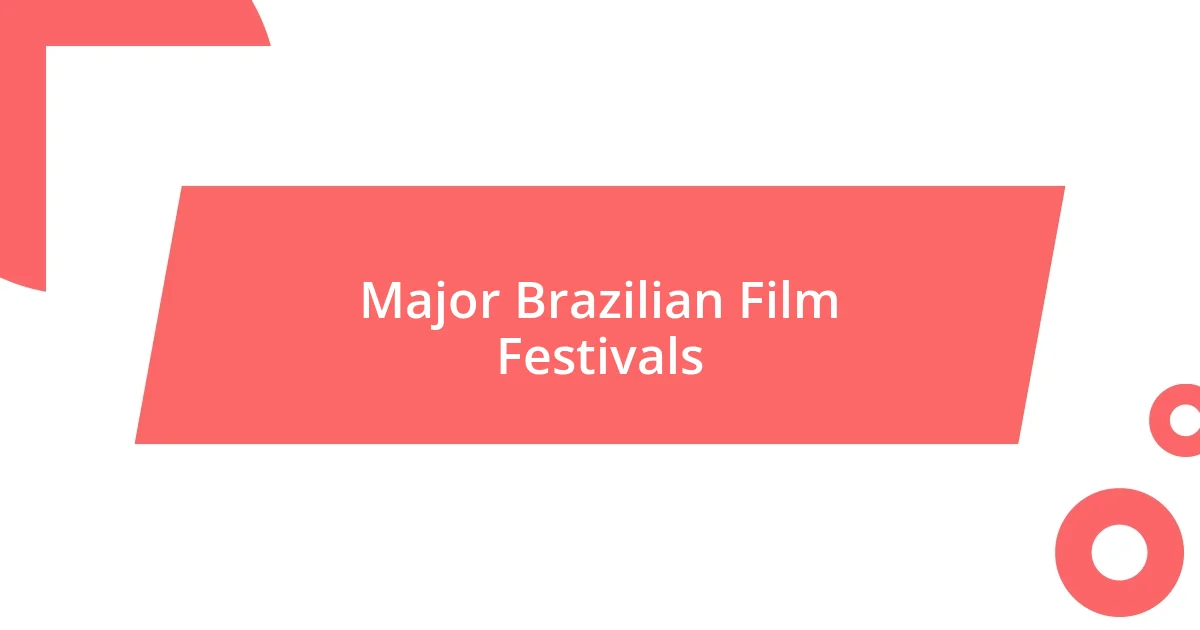
Major Brazilian Film Festivals
Brazil is home to several prominent film festivals that not only celebrate the art of cinema but also provide a platform for discussions around pressing social issues. Among them, the São Paulo International Film Festival holds a special place in my heart; the energy at this festival is simply electric. I’ll never forget the buzz in the air as filmmakers discussed their films and audiences left screenings buzzing with new ideas.
Here are some major Brazilian film festivals to know:
- Festival do Rio: Known for showcasing both local and international films, it’s a must-visit for cinephiles.
- São Paulo International Film Festival: Celebrated for its eclectic programming, it often features films from underrepresented regions.
- Brasília International Film Festival: Offers a unique perspective on Brazilian cinema and hosts creative workshops.
- Ponto Cine Festival: Focuses on experimental works and emerging filmmakers, providing a fresh take on the cinematic landscape.
- Cine PE: This festival spotlights regional cinema, where I once experienced a powerful short film that challenged societal norms.
Each of these festivals, with their distinctive flavors, contributes to the rich tapestry of Brazilian cinema. I always leave feeling inspired, often reflecting on my favorites well after the screenings have ended. There’s truly something special about witnessing stories that resonate deeply with both the local culture and universal themes.
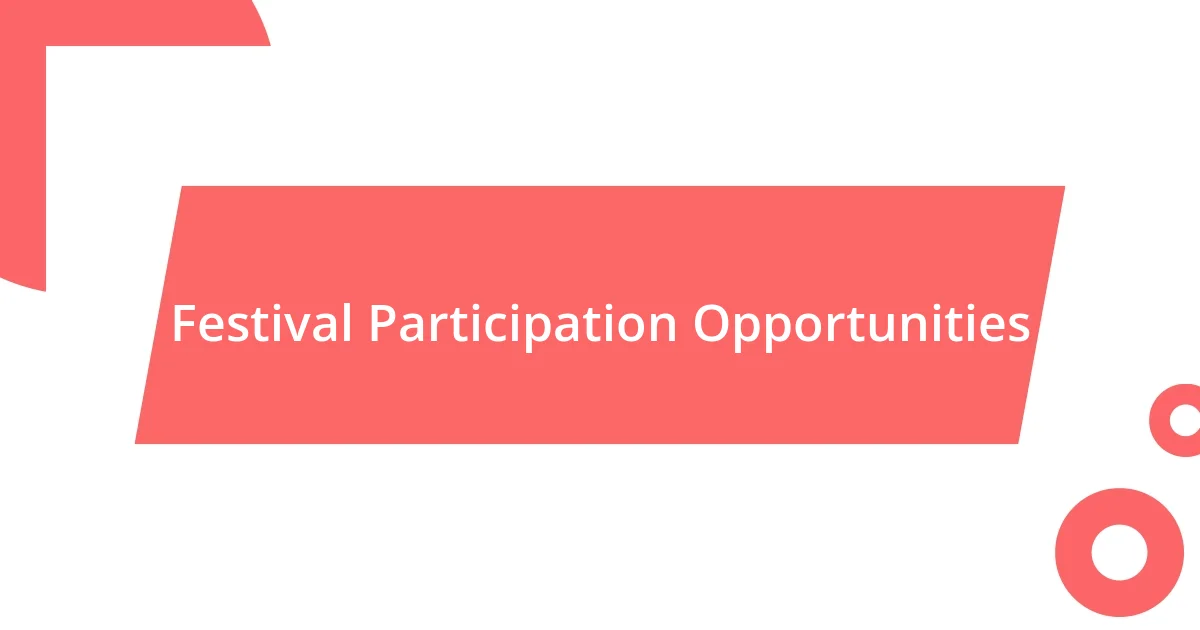
Festival Participation Opportunities
The opportunities for participation in Brazilian film festivals are both exciting and varied. Filmmakers can submit their work for consideration, which is a thrilling step in any creator’s journey. I remember the first time I submitted one of my short films; the anticipation was palpable. The thought of my work being screened alongside other talented artists filled me with both excitement and nerves. Festivals often provide workshops and panels that allow filmmakers to network, gain insights, and refine their craft. Isn’t it amazing how sharing experiences can spark new ideas and collaborations?
In addition to screening films, many festivals offer open forums for discussions and Q&A sessions. I recall attending a particularly engaging panel where local filmmakers shared their experiences in navigating the film industry. It felt like a window into their world, and their candidness made me feel more connected to the community. These interactions amplify the festival experience, transforming it from mere viewership to an enriching exchange of ideas. It’s not just about showcasing art; it’s about creating a dialogue around it.
Moreover, the commitment to inclusivity in these festivals opens doors for diverse voices. I once participated in a short workshop aimed at indigenous filmmakers, which was a powerful experience. The stories shared were not just about cinema; they were deeply rooted in culture and identity. This dedication to representation ensures that festivals reflect the rich tapestry of Brazilian narratives. Isn’t it inspiring how a single event can foster community, dialogue, and creativity in such meaningful ways?
| Festival Name | Participation Opportunities |
|---|---|
| Festival do Rio | Film submissions, workshops, networking sessions |
| São Paulo International Film Festival | Screening opportunities, panels, discussion forums |
| Brasília International Film Festival | Film submissions, creative workshops, industry meetings |
| Ponto Cine Festival | Submission for experimental films, workshops for emerging filmmakers |
| Cine PE | Regional film spotlight, community discussions |
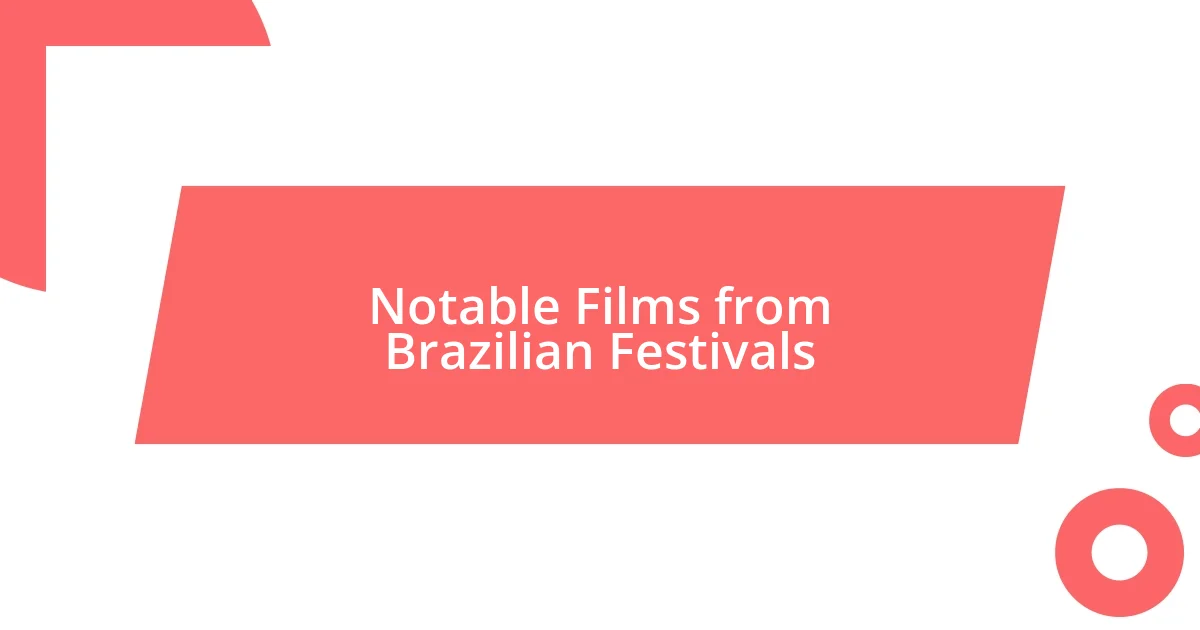
Notable Films from Brazilian Festivals
One of the standout films I’ve encountered at Brazilian festivals is “Central Station” (1998). This poignant drama unfolds the emotional journey of a retired teacher who forms an unexpected bond with a young boy, vividly highlighting themes of loneliness and redemption. I remember watching it in a packed theater at the São Paulo International Film Festival, where the shared silence during key moments felt like a collective breath being held. It was one of those films that stayed with me long after the credits rolled, sparking conversations among viewers about the power of human connection.
Another notable mention is “The Second Mother” (2015), which I had the privilege of viewing at Festival do Rio. This film offers a sharp critique of class dynamics in Brazil, beautifully portrayed through the eyes of a live-in housekeeper who reconnects with her daughter. The subtlety of its storytelling resonated deeply with me, prompting reflections on privilege and family. You know, there’s something incredibly impactful about films that mirror societal realities, don’t you think? They challenge us to look within and reassess our own perceptions.
Lastly, “City of God” (2002) remains a landmark in Brazilian cinema. Screening at multiple festivals, this gritty crime saga showcases the harsh realities of life in the favelas. What struck me was the vibrant cinematography paired with such stark subject matter. When I first saw it, I felt as if I were thrust into the heart of Rio, grappling with the complexities of hope and despair. It’s a testament to how film can serve as both a mirror and a magnifying glass, revealing not just individual stories but also the broader narratives of society. Isn’t it fascinating how these films spark not only emotions but also necessary dialogues around our world?
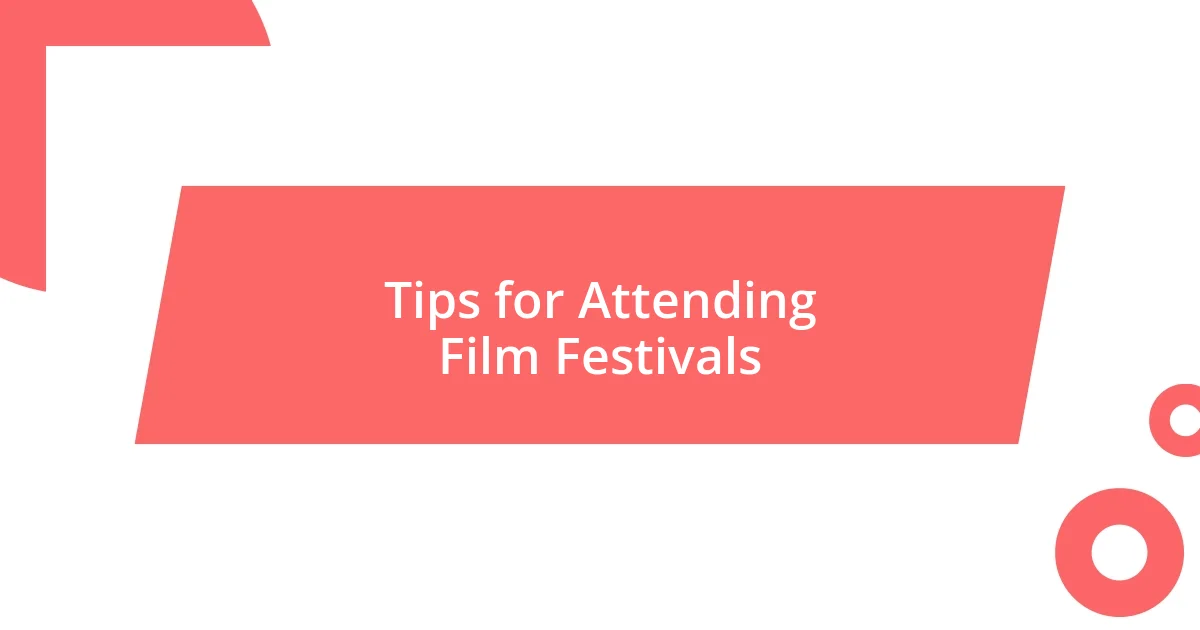
Tips for Attending Film Festivals
Attending a film festival can be overwhelming, but I’ve found that planning ahead makes a world of difference. Before I set foot in the venue, I always create a schedule of the screenings I don’t want to miss. You know that feeling when you snag a ticket to that coveted film? It’s exhilarating! But it can easily slip through your fingers if you don’t keep your eye on the clock. Prioritizing films based on your interests ensures you maximize your experience without missing out.
Don’t shy away from engaging with fellow festival-goers; make the most of that networking potential! I remember striking up a conversation with a fellow attendee while waiting in line. We bonded over our favorite films and shared our thoughts on Brazilian cinema. That spontaneous chat sparked a creative collaboration that I still cherish today. Who knew that a simple conversation could lead to such wonderful opportunities? Festivals are all about community—they’re the perfect backdrop for exchanging ideas and forming friendships.
Lastly, I always make time for those lesser-known films that may not be on everyone’s radar. One time, I stumbled upon a captivating short film at a small screening that had a powerful emotional impact. It might not have been the headliner, but it resonated deeply with me and sparked introspection. Have you ever discovered a hidden gem in such an unexpected way? Embracing the unknown can lead to some of the most enriching experiences at a festival, so keep an open mind and let the films surprise you!










